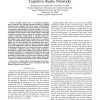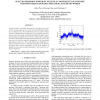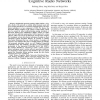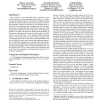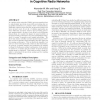1756 search results - page 14 / 352 » Cognitive Network Interference |
90
Voted
JSAC
2008
14 years 9 months ago
2008
Cognitive Radio (CR) is a promising technology that can alleviate the spectrum shortage problem by enabling unlicensed users equipped with CRs to coexist with incumbent users in li...
81
Voted
CISS
2008
IEEE
15 years 4 months ago
2008
IEEE
Cognitive radio is a desirable technique for secondary users to utilize the spectrum gray space. In order to avoid intolerable interference to primary users, the transmission powe...
INFOCOM
2008
IEEE
15 years 4 months ago
2008
IEEE
Abstract—Distributed spectrum sensing (DSS) enables a Cognitive Radio (CR) network to reliably detect licensed users and avoid causing interference to licensed communications. Th...
MOBICOM
2009
ACM
15 years 4 months ago
2009
ACM
The coexistence of two unlicensed links is considered, where one link interferes with the transmission of the other, over a timevarying, block-fading channel. In the absence of fa...
MOBICOM
2009
ACM
15 years 4 months ago
2009
ACM
In cognitive radio networks (CRNs), spectrum sensing is key to opportunistic spectrum access while preventing any unacceptable interference to primary users’ communications. Alt...
